Medicine’s cardiovascular specialists care for thousands of patients every year, in clinic and in hospital, focused on one mission–exceptional heart care for the people of North Carolina while advancing the science and clinical practice of cardiovascular medicine. Following is a look at service highlights.
Women’s Heart Program
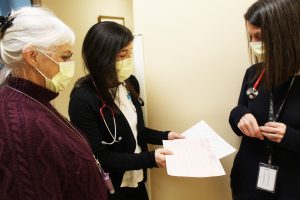
The UNC Women’s Heart Program provides clinic counseling as well as outreach in the state and community, educating women about cardiovascular risks and providing the tools to help them make good decisions about their heart health. Over the past 12-15 years, worksite wellness activities have included risk factor screenings and counseling. An initial grant in 2009 enabled providers to screen Chapel Hill Carrboro School employees, including teachers, staff and bus drivers, by checking lipid levels, blood pressures, weight/BMI, and providing education. From there, the program grew.
7th Annual Women’s Heart Symposium
UNC brings women’s heart health to the forefront every February with the annual UNC Cardiology Women’s Heart symposium. This year, the 7th Annual Women’s Heart Symposium will be a virtual event, free and open to all women interested in learning how to improve their heart health.
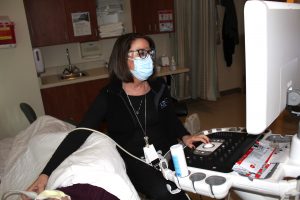
The event is scheduled for April. Expert physicians, nurses, nutritionists, exercise specialists, mental health experts and pharmacists, will discuss all aspects of women’s heart health. Topics have ranged from general heart health, atrial fibrillation and heart valve disease, to how to exercise safely at home, starting the Mediterranean Diet, and mental health strategies. Each year, participants are asked to suggest topics for the next year’s symposium. Organizers are currently working to finalize a panel that will address general and specifically requested topics. Coach Sylvia Hatchell will return as keynote speaker to kick off the event.
Paula Miller, MD, medical director of the Women’s Heart Program, hosts this annual event.
Adult Congenital Heart Defects
UNC cardiologists are building a comprehensive program specializing in the treatment of adults with congenital heart defects. The recently formalized “Adult Congenital Heart Disease Program” offers a seamless transition from pediatric to adult-oriented care. Medical and surgical advances in the last decades have enabled children born with complex structural heart disease to live far into the advanced stages of adulthood. Because of these advancements, the number of the adults living with congenital heart disease now outnumbers the number of children living with a congenital defect. The program provides individualized and comprehensive care for older teens and adults who are living with congenital heart disease, supported by a team of highly-trained experts that include board certified ACHD pediatric and adult cardiologists, congenital heart surgeons, cardiac imaging experts, electrophysiologists, heart failure specialists, and advanced practice providers (APPs).
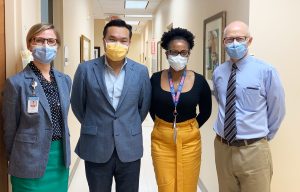
Providers have the ability to treat and repair newly-diagnosed conditions, such as septal defect (including a patent foramen ovale), anomalous coronary/pulmonary arteries and valvular disease, and continue the care of surgeries/repairs done in childhood (i.e., Ross procedure, Fontan conversion, Tetralogy of Fallot repair). Cardiologists and APPs also manage sequela from childhood surgeries, including heart failure, blood clots and arrhythmias. Because living with congenital heart disease as an adult is about much more than heart care, the program partners across multiple disciplines to assure patients receive comprehensive care. From reproductive to mental health, providers evaluate and develop a personalized treatment plan for patients who need monitoring throughout their lifetime. Outpatient services will be housed at UNC Heart and Vascular Center at Eastowne.
Lunise Benjamin, DNP, NP-C, is the UNC Adult Congenital Heart Disease Coordinator. Certified adult congenital heart disease physicians include Elisabeth Heal, DO, (pediatric cardiology), Michael Yeung, MD, Elman Frantz, MD (pediatric cardiology), Mirnela Byku, MD, Mahesh Sharma, MD, (cardiothoracic surgery) and Sandeep Sainathan, MD (cardiothoracic surgery). Read more about the ACHD in the UNC Department of Medicine Newsroom.
Outpatient Diuresis clinic
Heart failure has always had one of the highest readmission rates of any condition and approximately 80% of patients presenting to the ED with heart failure are admitted. These are costly encounters and historically, patients have had few alternatives when their oral diuretic regimens fail. The Outpatient Diuresis Clinic at UNC Meadowmont Heart and Vascular Center was designed to offer an alternative to admission to these patients. On October 13, 2020, the UNC Medical Center Improvement Council recognized the diuresis clinic team with a UNC Medical Center Quality and Safety Award for its tremendous success.
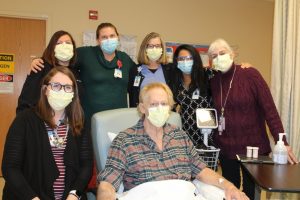
The success of the diuresis clinic is also attributed to its design. It was built as a co-management model, primarily managed by nurse practitioners and clinic nurses, but always having the patient’s primary cardiologist in the loop on their status and progress with intervention. This gives patients more immediate access to care. The clinic can facilitate earlier hospital discharges by addressing the ongoing diuresis needs of patients in the outpatient setting, and it has enabled UNC to reduce some inpatient hospital stays by as much as 2-3 days. From a patient perspective, this results in helping heart failure symptoms become much better controlled in an ambulatory arena.
In 2016, Thelsa Weickert, MD, had the idea for multidisciplinary ambulatory diuresis care and worked with the Department of Medicine’s Value-Care Action Group to open the clinic. Mirnela Byku, MD, a transplant cardiologist by training, joined the team in 2017, and currently leads the effort. Emily Baker, MSN, AGNP-C, is lead APP for the diuresis clinic, and Carrie Neal, RN, BSN, CCRN-CMC, is the nurse coordinator. Learn more from the UNC Department of Medicine Newsroom.
Atrial Fibrillation Care Network
The UNC Atrial Fibrillation Care Network grew out of a need for better coordination of AF care in the UNC system. Unfortunately, patients with AF bounce between the ED, urgent care center, primary care provider, cardiologist, and electrophysiologist. Patients frequently receive competing messages and care is often not consistent or of high quality. A novel care pathway is now providing a solution. The AF Care Network is the conglomeration of providers across the UNC Health Care system that have received specialized training for AF management. This includes providers (MDs, NPs, PAs, clinical pharmacists) that have been trained to manage acute AF issues in the AF Transitions of Care clinics and primary care providers who have become local experts in overall AF management.
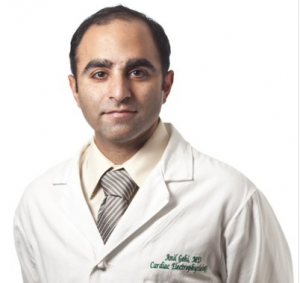
Improving AF Care with AF Transition Clinics
Led by Anil Gehi, MD, the first focus has been AF management in the ED. A study showed that nearly 90% of patients presenting to the ED at UNC Medical Center were being admitted. Review of these admissions revealed that many patients likely didn’t warrant admission for urgent therapy. However, there was no clear guidance in the ED for best acute management of AF and which patients truly warranted admission. In addition, there was no plan for a smooth transition to the outpatient setting. Patients were following up with primary care or cardiology after their hospitalization, but often these appointments were delayed and patients would return to the ED with a repeat episode of AF. The ED now has a clinical decision aid to help select patients appropriate for discharge. In addition, Gehi’s team set a standard for follow-up of AF patients at an AF Transitions of Care clinic within 72 hours. This quick access to specialty care has reduced repeat ED visits and hospitalizations. A protocol of care is delivered in the AF Transitions of Care clinics including key patient education, stroke risk assessment and prophylaxis with shared decision making, rate and rhythm control as appropriate, and planning for comorbidity management. Care is established and coordinated with the patient’s care team (primary care, cardiology, electrophysiology). These efforts began with a pilot project in 2015, funded by the UNC Center for Health Innovation. Success of this project led to an opportunity for a larger and more comprehensive initiative starting in 2017, which is currently being funded by the Bristol Myers Squib Foundation. There are now five AF Transitions of Care clinics across the state to serve several of the UNC Health Care system hospitals, including Chapel Hill, Raleigh, Siler City, Smithfield, and Rocky Mount. Referring providers can call the Carolina Consultation Center at 984-974-6301 to make a referral.
Improving Outpatient AF Care in the Community:
Beyond the ED, Gehi’s team has sought to improve outpatient AF care in the community. Through a virtual educational program, nearly 40 primary care providers have been trained to care for a high volume of AF patients on best practice management strategies for AF. The educational program draws from key opinion leaders from multiple specialties: electrophysiologists, cardiologists (including heart failure and hypertension experts), ED physicians, primary care physicians, cardiology pharmacists, endocrinologists, sleep disorder specialists, nutrition and weight management experts. All are working together to develop protocols of care and develop ideas on the best way to improve comprehensive AF care because a multidisciplinary team approach can provide the best patient care. Furthermore, patient education is an integral part of the program. Since each patient has a different learning style, high-quality, individualized education has been developed for patients. Patients are taught an “action plan,” for AF episodes. Patients are educated on their “treatment plan” which highlights the cornerstones of their AF management plan. Written material includes a comprehensive patient booklet, Living with Atrial Fibrillation, which encompasses key elements of how to live well with AF and how to manage AF risk factors. These important concepts are also discussed at quarterly virtual AF patient support groups meetings. Tiffany Armbruster is project coordinator for the AF Care Network. Anil Gehi, MD, is the project’s principal investigator.
Structural Heart Procedures in the Cath Lab
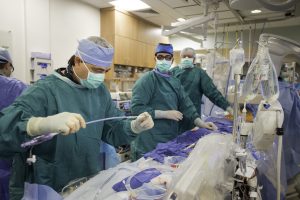
The UNC Medical Center Heart Valve Clinic at UNC Medical Center treats complex valvular heart disease, providing high quality collaborative care with a multidisciplinary approach, to meet the unique needs of patients with structural heart disease. The clinic offers patients minimally invasive treatments, including TAVR (transcatheter aortic valve replacement) for severe aortic stenosis, and MitraClip for severe mitral regurgitation. UNC’s TAVR program recently became the first TAVR center in North Carolina to be recognized as an American College of Cardiology Certified Transcatheter Valve Center. The certification recognizes shared decision-making, interdisciplinary collaboration, quality improvement, patient safety, and outcomes following transcatheter aortic valve replacement (TAVR). In January 2020, the UNC Medical Center team performed its 100th MitraClip procedure, and one year later, the team performed its 600th TAVR since the inception of the program in 2014. These milestones reflect the interdisciplinary efforts from multiple departments and disciplines all working towards one goal — exceptional patient care. An annual heart reunion at the UNC Friday Center brings patients and their families together with the Structural Heart Team, to celebrate successful patient outcomes. Learn more about the TAVR procedure in this UNC Health video. Learn more about the ACC’s Transcatheter Valve Certification here.
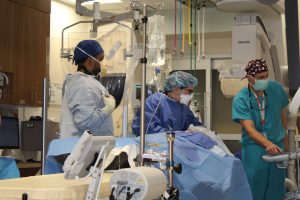
In keeping with UNC Medical Center’s mission to expand access to these life-saving therapies across North Carolina, the team has also helped to start four new valve programs, at FirstHealth in Pinehurst, Cape Fear Valley in Fayetteville, CarolinaEast in New Bern, and UNC Health at Nash. The team is participating in four clinical trials to evaluate new transcathether options for treating valvular and structural heart abnormalities, and has successfully obtained NIH and industry-sponsored funding for new research efforts. Collectively, the team has published over 100 manuscripts in the field of interventional cardiology and structural heart disease.